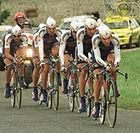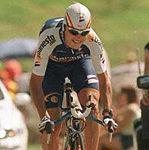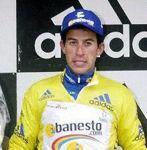
Recently on Cyclingnews.com |
An interview with Jose Miguel Echavarri
General manager of iBanesto.com
[This interview is available in both English and Spanish. The English version follows, with the Spanish words here - Ed]
 |
Jose Miguel Echavarri is a busy man - directeurs sportifs of Div I teams tend to be. Despite the odd interruption, he took time just before the Vuelta to tell Eloi Corres of equipoeuskadi.com and Martin Hardie what he thought of this year's Vuelta route, iBanesto's prospects and the team's rivals for dominance in Spain's Grand Tour.
Last Saturday, with less than two hours to go before the start of the Vuelta a España, the manager of iBanesto.com, Jose Miguel Echavarri kindly paid us a lot of attention. While we were doing this interview he was interrupted various times. Roberto Heras, the leader of US Postal, passed by his side and wished him luck. "Do we need more rice?" one of the team staff asked from beside Echavarri. A new Vuelta was about to commence for the most laurelled director of the world peloton, a man with 6 Tours, 4 Vueltas and 2 Giros in his palmares. This year his team has been the great dominator of the Spanish season, winning 6 of the one week tours, and focusing more on the day to day routine of the season, than preparing exclusively for the grand tours.
Cyclingnews: This year iBanesto.com have been the great dominators of the season. Will the team pay in the Vuelta for the strength that they have shown throughout the year?
Jose Miguel Echavarri: No, I don't think so. You don't have to choose one thing or the other. We have a large squad, and we didn't participate in the Giro so in this way we could distribute the calendar and the riders perfectly for all of the season.
I don't think that we will pay for it. Anyway, we have participated in many races in order to prepare for others, while other teams have remained at home to train. It seems that the method at the moment is not to race. We prefer to "entrenar con dorsal" [train with a race number on our backs] and others prefer to "entrenar sin dorsal" [train without a race number on their backs], to use a play of words. But definitively I don't think we will pay for the strength of our season.
CN: In that sense, your mode of preparation is different to the other teams like, ONCE; Euskaltel and Kelme, whose leaders did not compete during August. Why do you prefer this method of preparation?
JME: Well, we don't say that this form of preparation is better. But we prefer to continue with these "traditional methods" of preparing for races. Besides, if the top riders don't race in these types of races, well, why would they continue to organize them? So that only the lower level teams will ride in them? These races would end up disappearing or lower their category.
CN: What was iBanesto's objective this year: to shine in the Vuelta or the one-week tours?
JME: No, we were not conscious of that and anyway even in the smaller tours we also have the struggle for a grand podium. That was our objective, better said, our hope, more than objective for this season.
And the truth is that we came close in the last Tour. It is true that at the end Mancebo finished 7th, but 7th position did not correspond with the Tour that he rode, it is a classification a little out of tune with reality. The truth is that he could have actually been third.
 |
Also in this Vuelta Mancebo as much as Mercado could be actually within the top three, on the podium.
In the last Tour they spoke that the favourites were of the generation of '73, those that now are 28 years of age. In that sense our leaders are of the generation of '76, they now are 25 or 26, by that reason and logically we shall be hoping to see them at the top in a couple of years. You have to have patience to see them at the top.
It is certain that last year we had an excellent Vuelta, winning four stages and the mountains jersey, with a rider that is not now riding [José Maria Jiménez]. But now we are not... well, it will be difficult to repeat these results.
CN: Up till now the principal victories of the team have come in the one week tours. You had a Tour that was a little below what you had hoped, do you think it is possible that people will pigeonhole iBanesto as a team that cannot be one for the three week tours?
JME: No, how do you say in the school, "we progress suitably". What we have achieved this year is the logical progression for a rider of 23 or 24 years. To be in the front within two years, you have to be patient.
It is clear that you cannot make comparisons with the Great Miguel, Miguel Indurain. You don't have to put this pressure on the riders. You have to take into account that Miguel up until he was 27 did not win a grand tour. Also up until then also they said to us that he might be a "bloof" [a fiasco, a farce, something that never would materialise], and look at what happened later ...
We are trying to build strong foundations and a few solid pillars. That is our philosophy: go slow, creating a solid base. Look, to rise fast is easy, but it is not easy to maintain it. You have many riders that have risen rapidly but later they have also fallen quickly. What we are trying is that the plateau of the rider's yield, that the plateau is of a high yield and that it is maintained for as long as possible.
For what they are doing these kids [Mercado, Mancebo] are perfect for cyclists of their age.
CN: Which is the strongest man of iBanesto for this Vuelta?
JME: [Long silence] Nobody stands out above the rest ... Maybe one man that offers me a lot of security is Mancebo. He is a strong man, makes sacrifices, and is a worker. He gives me a lot of security; he is very consistent and will be up at the top.
 |
Also Mercado, who in the last year was a revelation, this year he came to be a reality and will return to be at the front.
In principle Mercado and Mancebo are the men that are the best guarantee for the general. Also Aitor Osa. In any case, the race will decide which one.
CN: Do you think that this is a Vuelta for the climbers or the time trialers?
JME: For the climbers [this time he answers without hesitating for an instant]. Yes, I believe that the route is clearly for the climbers. For this reason I think that this year men like Casero will have it very difficult unlike last year, because it is "arriba" [up].
Cyclists like Heras, Beloki or Sevilla will have it easier. These riders are very alike in the time trail and they will later play out the race in the mountains.
Others, that are time traillers, like Casero, or Igor Gonzalez de Galdeano, if they in good form -- I don't know how they are -- could create an advantage in the time trial, but it will be difficult for them to sustain it in the mountains.
CN: Then you believe that it is a route that benefits your team?
JME: Our climbers, yes.
CN: Speaking of the route, what do you think will be the most decisive, the mountains of the first week, with the Sierra Nevada and La Pandera, or the great mountainous stages, that come towards the end of the race, with el Angliru and La Covatilla?
JME: The Vuelta is very complicated. In the Tour, the first ten days are flat, for getting some form. You could come to it with a kilo or two and go and gain some form during the first week.
Here, each week has important challenges. In the 5th stage is the Sierra Nevada, in the 6th La Pandera. We could say that the Vuelta is like three mini races of a one week, linked by the two rest days.
The first week has these mountain stages and the stage of Ubrique [8th]. Look closely at this stage, is a stage of mountains, but without a high finish.
Later, you have the time trial and other complicated stages like that of the Collado Villalba, and the last week, you have the mountain of el Angliru, that great climb, and the la Covatilla, and then the final time trial.
CN: You have mentioned el Angliru. What do you feel about the inclusion of this climb in the route?
JME: Well, the organisation is looking for spectacle, and forgets a little the cyclist's spirit. The mountain is a little like the meeting point of the lovers of cycling, it is the grand appointment. A few shop to see who can put on the most difficult.
El Angliru up to now, the last two editions that it has be climbed, has been a hypocrisy, you have to say it clearly. The first 10 to 15 have climbed this mountain, the rest have climbed on the basis of being pushed. But well, you have to accept it. This year they say it will be fenced, you have to see it ... I don't know how it will go, if they will only fence the hardest kilometres, or what. Honestly I believe that you don't have to search for stories so extreme. Now I hear in the face of next year, the organisers have found a climb even harder still. It is a little like what has happened in Italy, with the Mortirolo. In the Giro next year they will climb a mountain that is one of extreme toughness [el Zoncolan].
I don't know, I think that they are searching for "the most difficult still", but this is losing a little respect for the cyclist.
CN: Speaking of the entries in this Vuelta, who do you think could be the best of the lot?
JME: Well, you have to be clear that moving the Vuelta to September has not helped it. From then on it has been a race that is very "domestic". The best entry? The super class of world cycling, like Armstrong do not come. Others like Ullrich, when they came to compete, they win the race. But the truth is that they are not necessary to see a great race.
Here many are named but very few are chosen. Then we have the case of Salvodelli, winner of the Giro, but in the first week he could go home [divine insight? - Ed] At the end those that go on to dispute the race will be the Spanish. Well, and also Simoni, that is of the big favourites.
Today it is seven years since the first edition of the Vuelta was held in September. And here we have the leaders of each team, with that the spectacle is guaranteed. That is it, that you can't see the forest for the trees. Many cyclists do not come in the same form that they had in the Tour.
CN: And who is for you the man to beat, the great favourite of the race?
JME: I don't know. I could answer you by responding something, to be speaking for the sake of speaking. At the moment you have six or seven favourites, and you will have many selections. Now in a few stages you will see the first selections, who is up and who not.
CN: And who is the best team? Could it be iBanesto?
JME: We have a very nice team, very nice. We have men with experience like Chente and Odriozola, youth with Lastras, Flecha and Ivan Gutierrez, a young leader that I have a lot of hope for is Aitor Osa. Together it is a very balanced team taking into account the route. We can defend in the echelons with Chente, in the mountains, with Mercado and Mancebo ...
I think that yes we could be the best team.
CN: What do you feel about the proposal of Unipublic of dividing the teams into two pelotons during the first week of the race? Is it viable?
JME: Well, I will give you my opinion. I don't like it and I wouldn't like it. Look, it is like the presentation of the Vuelta yesterday. The presentation was with singers, it wasn't made for the world of cycling. Well it is the same, they do not think about cycling. I wouldn't like it. I hope that they get some sense.
CN: To finish, a couple of questions about cycling in general. This year, neither iBanesto nor other Spanish teams have promoted "aficionados" [the Spanish elite category] to the professional ranks. Why is this? What consequences will this have for "ciclismo aficionado"?
JME: It is sad. The world crisis, because this is not just a crisis of cycling, but it is an international economic crisis. If the markets go well, the businesses go well and decide to diversify and invest in their image. But if the businesses are in a bad way ... and if some sport clearly helps the businesses it is cycling. Also you can see a little of the consequences of the bad image that is associated with doping. Cycling is in a unique position in that we are beaten over the head so much, and people believe what they hear.
The teams have reduced money available and so teams have to reduce their rosters and they can't give an outlet to the aficionados. Also in Spain we have a law that practically makes the Division Three teams unviable. This is putting a big cap on the inferior categories and many are saying, if I can not move up to the Division Three I will have to remain a "novillero" [literally an apprentice bullfighter].
CN: On the theme of the bad image that can be inferred in all of cycling, the affair of doping. Have the doping scandals that occurred in the past editions of the Giro influenced iBanesto not to ride in the Italian race?
JME: Man..., despite of that... yes it is a constant menace, but we didn't renounce our participation in the Giro for that reason. For me it is hard to say that cycling could have a bad image because of doping. When you see scandals like those of the great auditors, of thousands of millions, like the case of Arthur Andersen... that is the doping of society!
To me the sad thing is that it could tarnish the great work that has been done with cycling. But cycling continues to seem more profitable for the businesses. We live in a society a little bit consumed by football, but in cycling the relation between investment and profit is very acceptable for what it generates.
The story of the Giro was that the Spanish television did not transmit it. Why go and race in Italy if in my country nobody can see it?
The problem is that there is very bad distribution (i.e sharing of royalties and transmission rights). From our point of view, the UCI obliges us to race the World Cup events, but we do not see anything for the transmission rights, not so much as one Euro. Cycling has very bad sharing of the television rights; it is very badly balanced. In Italy the football league has been paralysed for this reason. What can we make ourselves?
So, if we don't receive anything for the television rights and we don't get any promotional benefit [for the sponsors], it's not worth the hassle to attend the Giro. And that is it what happened this year with this race.
